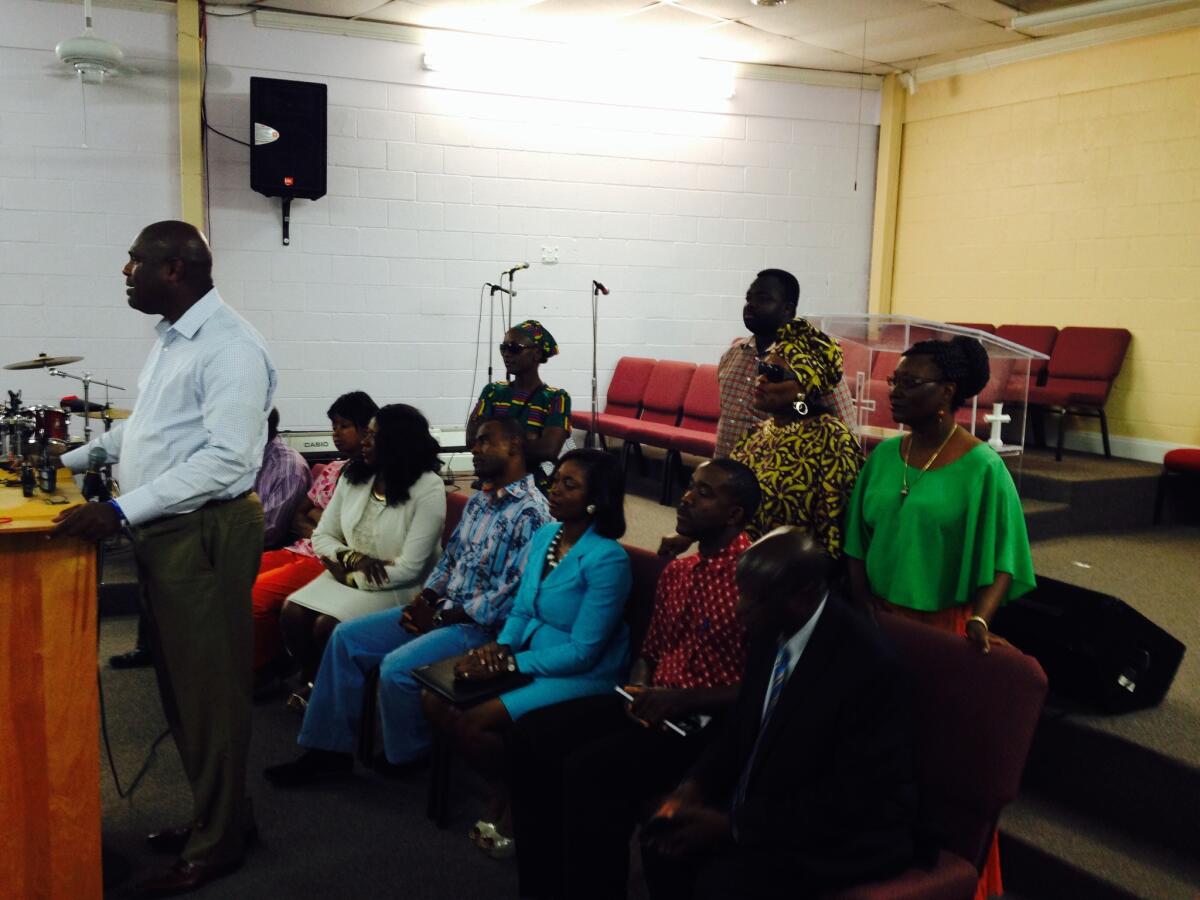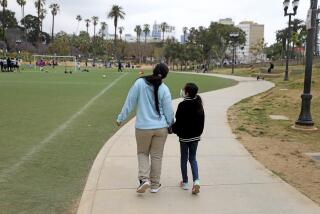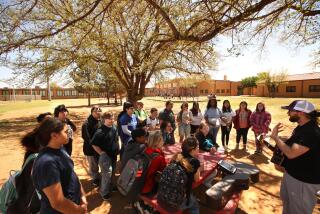Dallas-area Africans confront Ebola fears

- Share via
Reporting from Euless, Texas — In the days since a West African man traveled to the Dallas area, fell ill and eventually tested positive for the deadly Ebola virus, Carolyn Woahloe and other Liberians have heard the taunts.
“Go back to Liberia.”
Woahloe, a registered nurse, gathered recently with Liberian community leaders to spread the word: Please don’t blame Liberians.
Across the Dallas area, the specter of Ebola continues to grip a community. Parents have kept children home from school or avoided Texas Health Presbyterian Hospital, where Thomas Eric Duncan remained in serious condition with the first case of Ebola diagnosed in the U.S.
Four of Duncan’s close family members were confined to their apartment. Dallas officials said relatives left the dwelling after agreeing not to, thus prompting the confinement order.
Officials on Thursday also increased to 100 — from 12 to 18 — the number of people who were exposed to Duncan. Those people are being monitored for symptoms, such as a soaring fever.
Health experts said they were confident they could contain the disease, which is spread by contact with the bodily fluids of infected people who display symptoms. Still, that has not calmed fears in some quarters here.
Woahloe said she got calls from at least two Liberian workers who said colleagues told them they should leave the U.S. The nurse told them to stand their ground.
“If I am Liberian, that doesn’t mean that I have Ebola,” Woahloe said during a meeting at the New Life Fellowship Church in Euless, a Dallas suburb. “This is not a Liberian problem. This is a world problem.”
Five children came in contact with Duncan, and attendance Thursday at the four schools they attend was 86%. Dallas schools Supt. Mike Miles said that daily attendance was typically about 95% and that staff reported attendance as being usual at other schools.
“People do feel safe” at the schools, Miles said. “That’s why you had attendance that high.”
Still, there were signs of frayed nerves.
At Sam Tasby Middle School, attended by one child who was exposed to Duncan, a boy was so upset by the Ebola scare that he cried in a corner of the office, afraid to go to class. Staff members tried to reassure him, handing him hand sanitizer.
Even high school students are scared. “Nobody is touching each other. Nobody is shaking hands. Everyone is saying, ‘Get away from me; Ebola is going around the school,’” Dante Gonzalez, a senior at Conrad High School, told the Dallas Morning News.
Reacting to news that Duncan’s potential contacts had been ordered to remain in their homes and decline visitors, one woman posted a series of questions on the Facebook page of the Dallas County Health and Human Services Department.
“What is being done with these people’s trash that may carry the virus?” asked the woman, who identified herself as “a concerned Dallas Texas guardian of a child in the [local] school district.”
Dallas County Judge Clay Jenkins, the county’s top elected official, said Duncan’s belongings, clothes and household trash, possibly including his sheets, were bagged inside the apartment and would be collected. Several cleaning companies balked when asked to clean the apartment.
The Dallas medical community is scrambling to get out the word of the disease, not just in the multiethnic Five Points area where Duncan stayed before reporting to the hospital, but in other areas as well.
Steve Harrell, a spokesman for the Dallas County Medical Society, said one doctor delivering babies Sunday at Texas Health Presbyterian when Duncan arrived counseled worried new mothers.
“These moms were freaking out, giving birth to babies in the same hospital where an Ebola patient was being treated,” he said.
Chris Berry, a doctor who works in a community clinic with many West African patients, said the goal was to counsel people about the low likelihood of contracting Ebola.
“Our staff just had a meeting about this now,” he said. “Our job at this point is education.”
In north Dallas, home to a scattering of West African restaurants with a mostly black clientele, Thursday was business as usual. Yembol was doing a brisk midday trade, and at Aggie’s, where one of the daily specials was spicy goat stew, owner Aggie Akpo said few of her regulars mentioned the Ebola scare. “But they’re all sitting in here watching news of it on the big screen.”
Some residents here are asking whether Liberia’s borders should be closed to keep other infected people from leaving — although health officials have said Duncan showed no sign of illness when he left Liberia on Sept. 19.
“There are two sides to this story,” said Pastor Emmanuel Botchway. “When you close the borders of a country, you don’t just restrict the movement of people; you put a stop to trade and commerce. That would be terrible for Liberia.”
The anxiety has spread even to local Liberians themselves. Even though many have Ebola-infected relatives or friends back in West Africa, until now the fear of infection was a continent away.
Now many are afraid to come to church for fear of contracting the disease.
“It’s a scary thing,” said Stanley Gaye, president of the Liberian Community Assn. of Dallas-Fort Worth. He said community leaders had asked an expert from the U.S. Centers for Disease Control and Prevention to come and address Liberians about how Ebola is spread, to allay public fears. Gaye said the last thing Liberians needed was to be stigmatized.
Harling Moore, pastor at New Life Fellowship Church, said the local Liberian community — which numbers about 10,000 — had more to worry about than its public image: Their countrymen in Africa are dying. In the church parking lot, officials pointed to a semitrailer they said was loaded with medical supplies.
On Friday, it is to be sent to two hospitals in Liberia.
Jimmy Sando, 26, a Dallas-Fort Worth International Airport worker, called for calm and for the public to put recent events in perspective.
“Every major disease ... known to man starts somewhere, but it doesn’t stay in one place,” he said. “It spreads. Like AIDS.”
So please don’t point a finger at Liberia, he pleaded.
“This disease has been around since the 1970s,” Sando said. “It spread to countries like Nigeria and Liberia. You can’t blame Liberians, just like you can’t blame any one nation for AIDS.”
Botchway said pastors at nine Liberian churches would take to their pulpits Sunday to spread the word about the disease. They will implore citizens who might have come in contact with Duncan to go to the hospital and to contact the CDC.
“We will tell them that this is not a disease of shame,” he said. “If you think you might be infected, or if you know someone else, please come forward.”
But don’t even think of leaving the United States because of mean-spirited comments, Woahloe said. One woman told Woahloe that she now felt she had to return to Liberia.
“And I told her, ‘Don’t go anywhere. Just go to work.’”
john.glionna@latimes.com
molly.hennessy-fiske @latimes.com
More to Read
Sign up for Essential California
The most important California stories and recommendations in your inbox every morning.
You may occasionally receive promotional content from the Los Angeles Times.















